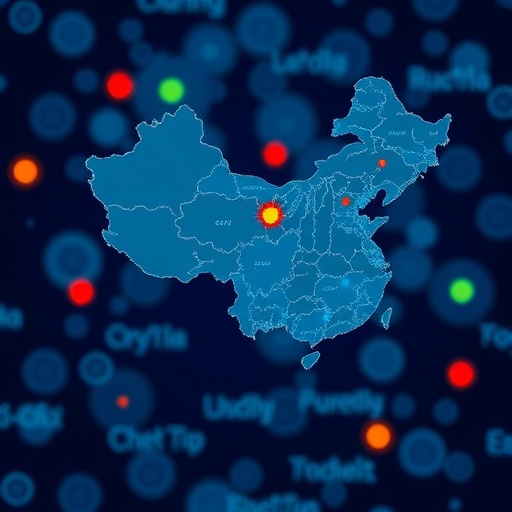Obsessive-compulsive disorder (OCD) has increasingly drawn the attention of mental health researchers due to its rising prevalence and complex etiological landscape. Recent epidemiological data position OCD as the fourth most common mental health disorder globally, affecting millions and profoundly impacting quality of life. Despite extensive research, the precise interplay among biological, psychological, and environmental contributors remains elusive. A groundbreaking cross-sectional study conducted in Southwestern China now sheds light on the multifactorial risk profile of OCD, employing advanced analytical techniques and machine learning models to untangle this complexity.
This innovative research, conducted from January to February 2023, involved over 1,500 participants recruited via an online platform, representative of the general population. The investigators meticulously compiled detailed demographic data, lifestyle variables, dietary patterns, and clinical symptomatology related to OCD. Utilizing validated classification scales enabled robust phenomenological assessment of obsessive-compulsive symptoms, ensuring diagnostic precision. What distinguishes this study is the dual application of traditional statistical methods alongside cutting-edge machine learning algorithms, including Support Vector Machine, Random Forest, and Back Propagation Neural Networks, to discern the relative contributions of diverse risk factors.
Logistic regression analysis revealed several critical health-related variables significantly associated with increased OCD susceptibility. The presence of a prior medical history emerged as a notable predictor, indicating that underlying comorbidities or chronic health conditions may amplify vulnerability to obsessive-compulsive pathology. This finding underscores the need to consider an individual’s broader health context in psychiatric risk assessments and intervention planning, moving beyond isolated symptom approaches.
Intriguingly, sleep disturbances were identified as an independent risk factor, corroborating existing literature that links circadian dysregulation with OCD symptom exacerbation. Sleep architecture abnormalities have often been implicated in impairing cognitive flexibility and emotional regulation, potentially facilitating obsessive thought patterns and compulsive behaviors. This study further solidifies the mechanistic ties between sleep quality and OCD, highlighting the therapeutic potential of targeted sleep interventions.
Gastrointestinal (GI) symptoms constitute another pivotal finding, revealing a hitherto underexplored axis between gut health and psychiatric manifestations. The gut-brain connection, increasingly recognized in neuropsychiatric research, suggests that intestinal microbiota imbalances and inflammatory processes might influence neural pathways involved in OCD. The positive association of GI disturbances with OCD risk in this large cohort supports hypotheses proposing microbiome-modulating strategies as adjunctive treatments for obsessive-compulsive symptomatology.
Abnormal defecation patterns were also linked with heightened OCD propensity, reinforcing the gut-related narrative and suggesting a somatic dimension to the disorder’s etiology. These results may pave the way for integrative models that incorporate gastrointestinal biomarkers and physiological data alongside traditional psychological assessment, fostering a holistic understanding of obsessive-compulsive disorder rooted in systemic bodily processes.
Of particular significance is the study’s identification of picky eating as a risk factor, an aspect often neglected in psychiatric epidemiology. Dietary selectivity may reflect underlying neurodevelopmental vulnerabilities or sensory processing anomalies that converge with obsessive-compulsive tendencies. Furthermore, nutritional deficits associated with restrictive eating might exacerbate neurochemical imbalances, potentiating symptom severity. This revelation encourages a broader lens in clinical evaluation, emphasizing nutritional history as part of comprehensive OCD risk profiling.
The consistent validation of these findings across machine learning platforms lends high credibility and predictive value to the identified risk factors. By integrating complex nonlinear relationships and high-dimensional data, techniques such as Random Forest and Support Vector Machine offer unparalleled precision beyond traditional linear models. Such computational approaches enable more accurate stratification of individuals by OCD risk, facilitating personalized prevention strategies and early interventions.
This research heralds a paradigm shift in understanding obsessive-compulsive disorder, emphasizing multidimensional risk architecture involving interconnected physiological and behavioral domains. It also accentuates the value of large-scale, data-driven investigations marrying epidemiology with artificial intelligence to decode psychiatric disorders that have historically been challenging to characterize.
Clinicians and researchers are encouraged to incorporate these nuanced risk determinants into their frameworks when designing therapeutic plans or public health policies. Early identification of individuals with medical comorbidities, sleep disturbances, GI symptoms, and dietary irregularities could enable preemptive measures, potentially reducing the burden of OCD at both individual and societal levels.
Moreover, these insights open promising avenues for future research aimed at elucidating the underlying biological mechanisms linking peripheral bodily functions and central nervous system dysregulation in OCD. Exploring microbiome composition, inflammatory markers, sleep architecture, and nutritional biomarkers may yield novel targets for pharmacological and behavioral therapies. The integrative approach advocated by this study exemplifies the trajectory toward precision psychiatry.
In conclusion, the study conducted by Chen et al. represents a substantial advance in psychiatric epidemiology, highlighting that obsessive-compulsive disorder does not arise in isolation but is interwoven with diverse somatic and lifestyle factors. Their cross-sectional analysis from Southwestern China contributes impactful evidence to the global understanding of OCD’s multifaceted etiology. Ultimately, embracing complex, systems-level perspectives will be paramount in developing effective interventions and alleviating the burden of obsessive-compulsive disorder worldwide.
Subject of Research: Risk factors contributing to obsessive-compulsive disorder, including medical history, sleep disorders, gastrointestinal symptoms, and dietary habits.
Article Title: The risk factors of obsessive-compulsive disorder: a cross-sectional study in Southwestern China
Article References:
Chen, H., Feng, J., Wang, M. et al. The risk factors of obsessive-compulsive disorder: a cross-sectional study in Southwestern China. BMC Psychiatry 25, 829 (2025). https://doi.org/10.1186/s12888-025-07281-6
Image Credits: AI Generated
DOI: https://doi.org/10.1186/s12888-025-07281-6




